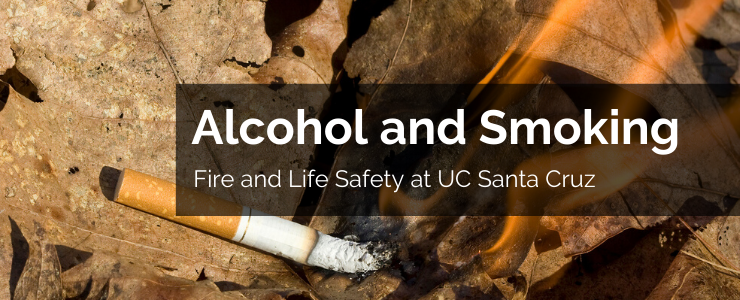Alcohol, Smoking and Fire Safety
Although alcohol use and smoking are expressly prohibited on the UC Santa Cruz campus, students are regularly exposed to both willingly or not. This page aims to provide resources about the fire risks posed by the use of both alcohol and smoking in addition to mitigation factors. Of course, the greatest mitigation factor is simply 'don't do it,' but failing that here are several steps you can take to minimize the risk to yourself and your community.
Alcohol
With regard to alcohol, the biggest risk is the impairment of your judgment. Judgment may be impaired with as little as 0.02% Blood Alcohol Content (BAC). It is important to separate yourself from decision-making or potentially dangerous situations when you are drinking. These include:
- Cooking (Kitchen or Outdoor BBQ)
- Smoking
- Operating Machinery/Devices
- Exercising
- Mixing with other potentially hazardous substances such as painkillers.
Before drinking, it is important that you have an established plan (created while sober) for decisions you may need to make while drinking. If you are going to a place you are unfamiliar with, where are the exits/the fastest way out? If you are planning to drink with friends, how will you get home? Planning is relevant for both fire safety and personal safety and you are encouraged to be proactive with it!
More Information
Campus Fire Safety - Alcohol and Fire (PDF)
Smoking
Although preventable, deaths from smoking-related fires are a leading cause of fire deaths in the United States. Smoking in all forms, including e-cigarettes, have significant fire safety implications. If you smoke, you can mitigate the danger posed to yourself and those around you by practicing the following safety guidelines:
- Use only fire-safe cigarettes. (The letters FSC will be above the barcode)
- Do not smoke indoors.
- Keep cigarettes, lighters, and matches away from children.
- Use a deep and sturdy ashtray placed away from anything that can burn.
- Do not discard spent cigarettes in vegetation or near anything that can ignite easily.
- Make sure to ensure that cigarette butts are no longer ignited before throwing out, preferably through dousing in water or sand.

